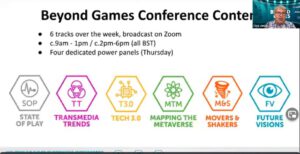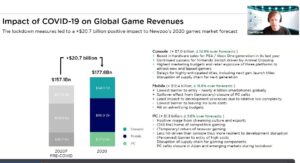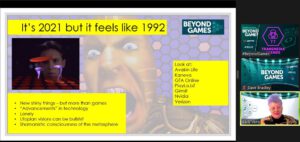Game Industry gatherings in 2021 continue to ride on the wave of prosperity caused for them by the pandemic: GamesBeat Summit, GamesIndustry Investment Summit and LA Games Conference focused heavily on the business challenges of preserving and monetizing the current dynamics. Building on these advantageous circumstances, Beyond Games now reaches out for crossover possibilities for the leading medium of our troubled times.
The 5-days conference offers virtual lectures and panels organized in theme blocks with matchmaking and connection systems on various platforms. The topics cover actual trends in media compatibility, technology advancements, financing and future developments, comparable to other game business conventions. Whereas GamesBeat focuses more on the M&A perspectives of the industry, LAGC covers these trends under an overarching interest for distribution and franchising management, and GI Live presents them in the framework of funding orientations for game developers.
Beyond Games started with a detailed overview on the state of the industry, looking back at an extraordinary prosperous year 2020, but making clear that 2021 may experience some slowdown. Hardware supply problems, legal disputes on platform competition and changes in privacy business practices may lead to reorientation necessities for established industry segments. In terms of reorientation, the event offered an impressing line-up of experienced front-runners, always able to reconnect the latest trends to historical precursors while pointing out innovative possibility spaces between gaming and non-gaming industries.
I was especially fascinated by their takes on the fashion industry, more creative and original than at technology dominated Wearable conventions and very illustrative use cases for actual considerations on the monetization of virtual goods. Basically, all these conferences consider the gaming industry itself as an interconnected consumer crowd platform to be managed and monetized through participatory UGC, subscription strategies and transmedia production. Apart from this evermore conventional vision of turning the interactive media industry into a gold, data and crypto mining shell company, aka the Metaverse, Beyond Games also identified spatial computing as a long-term trend for the gaming future.
But unboxing the XR complex is as delicate and difficult as it is for the Metaverse trope, especially in a flat screen habitat. Highly competent immersive media experts needed half of their panel time for coming to terms with VR, AR and MR distinctions before facing the opportunities and restrictions of their adoption in our times. Another excellent panel asked the right questions to overcome this inconvenience by debating the pros and cons of tradition and disruption for advancing the interactive entertainment industry – with the rather indecisive and a little shy outcome that innovation tends to be a risky business.
While many game conventions actually deal with internal reorganization, inclusion and interconnections inside the gaming area to foster the tides of our time, Beyond Games takes a fresh look out of the box without radically thinking out of this box, yet. The business event serves as a very inspiring think tank with an open-minded and vivid community, pointing to the viability and compatibility of games and maybe to a future beyond them.











